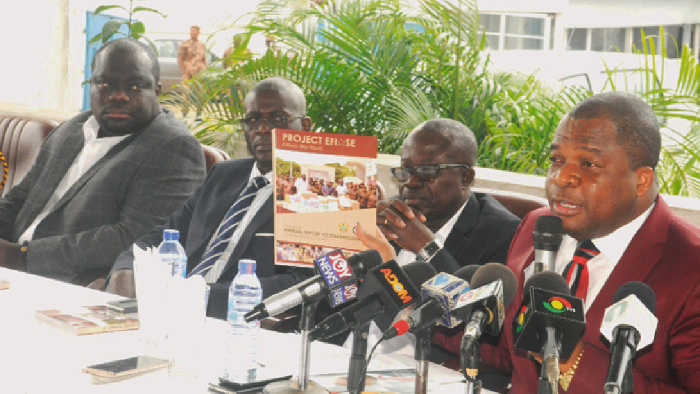
Prisons Service launches short code for Efiase Project
The Ghana Prisons Service has launched a short code, 9050, as part of fundraising measures for its Efiase Project.
Advertisement
The Chairman of the Prisons Council, Rev. Dr Stephen Yenuson Wengam, who launched the code, made a passionate appeal to the public and corporate Ghana to support the service to address the deplorable conditions in Ghana’s prisons.
It costs GH¢1 to send ‘Prison Service’ to the shortcode.
The occasion was also used to launch the Annual Report on Project Efiase and Prison Week celebrations aimed at encouraging transparency within the service and highlighting the achievements and challenges of the penal system.
The service, in July last year, launched a strategic plan, along with a fundraising campaign known as Project Efiase, to reform the penal system and improve the welfare of prisoners and prison officers.
Prison health needs
Rev. Dr Wengam said the service would, this year, recruit doctors and other medical persons as part of interim measures to establish a health directorate and construct a prisons hospital.
Currently, the service does not have a single medical doctor, a situation that makes it difficult to provide quality healthcare services for both officers and inmates, as the few health professionals take care of the infirmaries where they offer first aid services to inmates. Serious cases are often referred to government hospitals.
Rev. Dr Wengam observed that it was worrying that although the service was the only security agency that took care of incarcerated people, it had no hospital for its inmates or officers.
According to the report, which touches on a number of issues, including the progress and audited account of Project Efiase, the high level of congestion and poor conditions in the prisons were due to an acute lack of resources which had turned the prison environment into incubators of diseases.
It, however, said the establishment of hospitals for the service would, among other things, provide better access for prisoners, correctional officers and their dependents, as well as the public, reduce the health bills that currently burden the service, provide ready health data or analysis of the country’s prison population, as well as facilitate efficient transfer to other facilities for vital services not offered in infirmaries.
He said the council had appointed a committee that had started the health needs assessment of the service.
Project Efiase accounts
About the finances of the project, the report indicated that the service received GH¢252,264.70 in cash and spent GH¢115,088.23 on activities, leaving a balance of GH¢137,176.47 in its account.
According to the report, the service would need GH¢25 million annually to run projects earmarked for the country’s penal system.
Rev. Dr Wengam discredited allegations that funds raised for the project were being misused by the council, adding that every single pesewa had been accounted for.
“Nobody asked us to account or print this but because we want transparency, we had to do this,” he said.
Blueprint
He said the Prisons Directorate had been charged to develop a blueprint for the implementation of the report, as the council looked for funds to implement it.
He mentioned some achievements of the council to include sustained advocacy on the plight of the Ghana Prisons Service, capacity building for prison officers through the support of the US government, a needs assessment of the country’s prisons by the US government, Malaysian government scholarship for officers, and getting President John Dramani Mahama to visit the Nsawam Medium Security Prison to appreciate the conditions and plans for the construction of a prisons hospital.
“We are poised to transform our prisons and make them centres of excellence,” he said, while appealing to corporate Ghana to come on board to support the service.
With prison officers living in deplorable accommodation, he said the council had received some proposals which had been submitted to the Interior Ministry, while it was exploring other options to provide fitting housing for the more than 5,500 officers.
Arrears
Responding to questions on medical, accommodation and suppliers arrears the service owed, the acting Director-General of the service, Mr Emmanuel Yao Adzator, said the government had released funds covering accommodation arrears from January to December last year.
He said the service had received assurances that the remaining arrears would be settled soon.



